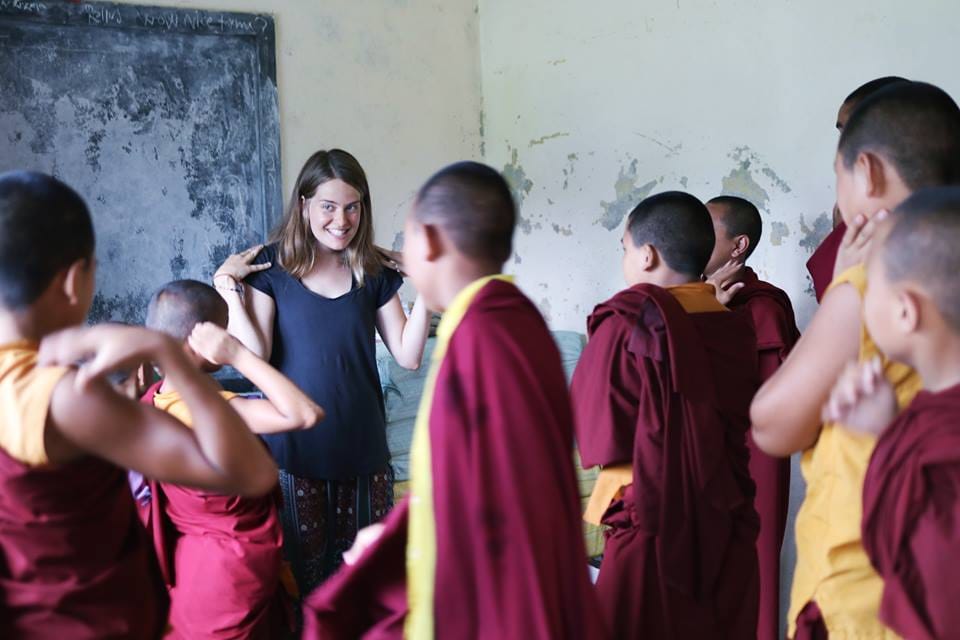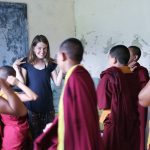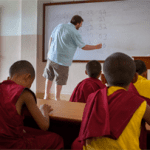
Are you looking to teach English at a Buddhist monastery in Nepal? Then join our volunteer program that will allow living in a Buddhist monastery and learning day to day Buddhist culture.
Did you know that there is more than one form of Buddhism? Mahayana, Hinayana, Vajrayana, Therevada are all different schools of Buddhist thoughts and tradition. Nepal holds a significant place in Buddhist history, as it is the birthplace of the Buddha. Thousands of Tibetan monks have lived in exile in Nepal since China invaded Tibet in 1959. While the Tibetan monks are now free to practice their religion and express their culture and heritage, they remain an underprivileged and marginalized group. As a teaching volunteer at a Buddhist monastery, you can explore them all.
Volunteer in our teaching English at a Buddhist monastery project and visit sacred Buddhist shrines. To the Northeast of Kathmandu is Bouddhanath. Bouddha is one of the most important centres for Tibetan Buddhism, and you can see red-robed monks circling the huge base beneath ribbons of prayer flags, chanting and spinning prayer wheels. Boudhanath includes over 20 monasteries and boasts a 36-metre stupa. The stupa is one of the most ancient Buddhist sites in the world. West of Kathmandu, Swayambhu stupa (also called the monkey temple) looks out across the chaotic and colourful city. To the southeast of Kathmandu is Namo Buddha, another important pilgrimage site, where the Buddha is said to have allowed himself to be devoured by a tigress, as she was starving and had a desperate need to feed her cubs.
Historically, education in Buddhist monasteries in Nepal has focused on scriptures and beliefs. Despite a more recent expansion in the scope of subjects, including English and Computer Science, teaching remains rudimentary, and standards vary dramatically between institutions. In recent years, the Buddhist monasteries and nunneries have allowed international volunteers to teach English to Buddhist monks.
The primary goal of the Teaching English at a Buddhist Monastery and Nunnery Project is to ensure positive exchanges of culture, skills and knowledge between volunteer and Tibetan monks at a Buddhist monastery. The project offers volunteers a unique opportunity to gain a deep insight into Buddhist culture and day to day practices, with one thing in common: a desire to learn. This project is an excellent way for international volunteers to learn about Tibetan Buddhist culture and also have an opportunity to teach English to Buddhist monks and nuns.
Teaching English at a Tibetan Buddhist Monastery or living with monks in Nepal will be different from what you imagine from thousands of miles away. Nothing like in the west exist here. There is no timetable, events will occur without prior warning, and you might find the lesson you worked hard to prepare may be cancelled and replaced by a ritual.
There will be many festivals and events during your stay in the Buddhist monastery. So, be prepared to change plans, respond to their way of life and be creative with them. In return, you will become a part of everyday life while living in a monastery, participating in rituals and gaining a rare and unforgettable insight into spiritual life. Hence, expect you to be flexible, kind and caring.
As a Teaching English volunteer at a Tibetan Buddhist monastery, you will have access to a small library of Dharma (religious) books; the monks will gladly share their philosophy and culture as much as their English allows. In addition, if you are interested in Karma, then living with monks in Nepal will allow you to explore its origin and deeper meaning. Depending upon your interest and expertise, you will be involved in one or more of the following activities:
- Help provide basic conversational English to Buddhist monks/nuns, who range from children to adults, in our partner Tibetan monasteries;
- Arrange creative activities, such as games, songs, drawings and painting;
- Make teaching English and learning process fun and engaging;
- Lead recreational activities to foster learning, such as word games;
- Share any other area of expertise you may have with the monks and nuns, such as knowledge of medicine, science, business or similar;
- Work with monks and nuns in other aspects of learning, such as sports, art or music.
- Help with cleaning activities, gardening. Stay creative and proactive.
Project Specific Skills
- Excellent inter-personal communication skills
- Able to give clear instruction and direction
- Lateral and creative thinking
- Proficient in conducting classes
- Basic English language requirements
- Previous experience in teaching would be an asset
Desirable/ Common Skills
- Excellent communicator with good interpersonal skills
- A team player with good workethics
- Time management and leadership qualities
- Adaptable, flexible and able to work under pressure
- Accepting of different ideas and culture
- Problem solving: always be part of solutions than part of a problem
- Creative
- Positive attitude
Requirements
- Gender: Female / Male
- Minimum Age: 18+ years (16-17 years old person can volunteer but need to present parents’/ guardian’s consent letter)
- Language:English (Intermediate)
- Educational:High School Graduate
Your Experience/ Setting
Upon your arrival at Kathmandu Tribhuvan International Airport (TIA), you will receive a warm welcome and be transported to your hotel or hostel. If you are already in Nepal before the start of your placement, we can make alternative arrangements for you. You will undergo a comprehensive two- to three-day induction program after arrival. This induction will provide valuable information about your project and general information about the Nepalese language, culture, health, safety, and security. It is also an excellent opportunity to connect with fellow volunteers and interns who can become your companions for sightseeing and a source of support throughout your volunteer placement.
During the induction period, you will be accommodated in a budget hotel or hostel arranged by VIN. However, most of the VIN experience involves living with a Nepalese host family. While this immersion is essential for a complete experience, we understand that it can be challenging as you adapt to a new culture and adjust to facilities that may be more basic than you are accustomed to. Don’t worry; all our host families have experience accommodating volunteers, although their English-speaking abilities may vary. Also, you will have 24-hour access to our staff members for support and assistance throughout your placement.
Volunteers will be assigned to one of VIN’s working areas, which include Tarakeshor Municipality in Kathmandu, Taluwa, Thulachhap, and Bhadaure in Okhaldhunga, and Okharpouwa and Kaule in the Nuwakot district. While at the working site, volunteers are requested to bring their lunch box, water bottle, safety gear, face mask, and any other essential belongings. We advise volunteers to dress comfortably and modestly, preferably with long sleeves. Please get in touch with us for guidance and support if you want to raise project funds or collect project-specific resources. This will help the community a lot.
Schedule and Commitment
You will work five to six days a week, up to six hours per day. You may propose your preferred time and hours; however, the working time period will be dependent on the institution you have been placed. A minimum of 2 weeks’ time commitment is expected of a volunteer. The longer you commit; the better impact you can make. You should be willing to commit a certain amount of your free time and energy, show a lot of commitment and be a good listener. You are expected to work constructively and co-operatively maintaining good reputation and standards at all times. Volunteer should abide by relevant security concerns and access procedures. Moreover, you should be receptive and positive to performance appraisal, advice and feedback. Throughout your placement, you will have the full support of VIN. Your safety is our highest priority.
Your typical day might look like this:
| 07:00-08:00 | Tea/Leisure Time |
| 08:00-09:00 | Breakfast/Brunch (Nepali meal – Daal-Bhaat) |
| 09:00-10:00 | Preparation for sessions |
| 10:00-13:00 | Conduct classes |
| 13:00-14:00 | Lunch (Packed lunch) |
| 15:00-17:00 | Conduct classes |
| 17:00-20:00 | Preparation for next day/Leisure time |
| 20:00-21:00 | Dinner (Nepali meal – Daal-Bhaat) |
You will receive a clear and concise on-the-job instructions, course of action, context of work and policies/strategies before your placement begins. You will be provided with ample of guidance and support throughout the placement with trainings / onboarding sessions incase necessary. You will be in a constant communication and regular check-in with the VIN volunteer coordinator. VIN aims to maintain a culture of continuous feedback between the volunteer supervisor at the placement to monitor the performance of the volunteer and ensure the project delivers desired outcomes.
In case of an emergency, you may contact one of our Volunteer Coordinators who will be available anytime for your assistance and support.
Click here to Learn more on how volunteering works
Mid and Long Term Volunteers:
2 weeks minimum stay- € 380
3 weeks – 480€
4 weeks – 580€ (after 4th week, for each additional week €95)
University Internships:
4 weeks minimum stay- € 680 (for each additional week – €105
Click here to Learn what’s included and excluded in our Fees Section
Click here to Learn recruitment process on how volunteering works
Our projects are open year-round, and our inductions begin on the first and third Mondays of each month. We would like to ask that volunteers arrive one day before the start of the induction. You can choose the duration of your participation based on your available time. However, so that you know, our volunteering placements are limited. We highly recommend booking your placement in advance to secure your placement. Click here to apply.




 Member of
Member of